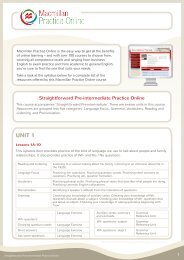Building relationships - Attica
Building relationships - Attica
Building relationships - Attica
Create successful ePaper yourself
Turn your PDF publications into a flip-book with our unique Google optimized e-Paper software.
unit<br />
3<br />
<strong>Building</strong> <strong>relationships</strong><br />
‘If you destroy a bridge, be sure you can swim.’<br />
African (Swahili) proverb<br />
overview<br />
vocabulary<br />
Describing relations<br />
listening<br />
Business<br />
partnerships<br />
reading<br />
Business networks<br />
in China<br />
language review<br />
Multi-word verbs<br />
skills<br />
Networking<br />
case study<br />
Al-Munir Hotel<br />
and Spa Group<br />
starting up A Work in pairs. ask each other the questions in the quiz. then turn to<br />
page 132 to find out how good you are at building <strong>relationships</strong>.<br />
1 YOU ARE IN A ROOM WITH A<br />
GROUP OF PEOPLE WHO DON’T<br />
KNOW EACH OTHER. DO YOU:<br />
a) introduce yourself<br />
b) introduce a topic of<br />
conversation<br />
c) wait for someone to say<br />
something<br />
2 WHEN YOU ARE INTRODUCED<br />
TO PEOPLE, DO YOU<br />
REMEMBER THEIR:<br />
a) name<br />
b) face<br />
c) clothes<br />
3 ON FESTIVE OCCASIONS,<br />
E.G. NEW YEAR, DO YOU:<br />
a) send greeting cards to everyone<br />
you know<br />
b) reply only to cards received<br />
c) send e-mails<br />
4 DO YOU THINK<br />
SMALL TALK IS:<br />
a) enjoyable<br />
b) a waste of time<br />
c) difficult to do well<br />
5 DO YOU PREFER:<br />
a) to socialise with colleagues only<br />
if you have to<br />
b) to socialise often with<br />
colleagues<br />
c) not to socialise with colleagues<br />
6 DO YOU LIKE TO HAVE<br />
CONVERSATIONS WITH:<br />
a) people who share your<br />
interests<br />
b) almost anyone<br />
c) people who are your social<br />
equals<br />
B<br />
You are going to listen to gillian Baker, Business relations Manager with an<br />
international training organisation, talking about how companies can build<br />
strong business <strong>relationships</strong>. What factors do you think she will mention<br />
C<br />
CD1.15 listen to the interview and check the predictions you made in<br />
exercise B.<br />
22<br />
D<br />
What are the most important <strong>relationships</strong> for you a) at your place of work/<br />
study, b) outside your place of work/study Why<br />
M03_MARK_CB_UINGLB_9935_U03.indd 22 27/10/2010 10:29
vocabulary<br />
describing<br />
relations<br />
A<br />
unit 3 •• <strong>Building</strong> <strong>relationships</strong><br />
Complete the table below with these verbs, which are often used with the<br />
word relations.<br />
break off build up cement cultivate cut off damage develop disrupt<br />
encourage establish foster improve jeopardise maintain promote<br />
restore resume sever sour strengthen undermine<br />
positive meaning<br />
build up relations<br />
negative meaning<br />
break off relations<br />
B<br />
Choose the correct verb in each sentence.<br />
1 Sales staff who are impolite to customers disrupt / damage the reputation of a<br />
company.<br />
2 We are planning to promote / establish branch offices in Spain next year.<br />
3 By merging with a US company, we greatly strengthened / maintained our sales force.<br />
4 Relations with customers have been fostered / undermined recently by poor after-sales<br />
service.<br />
5 Thanks to a new communications system, we are souring / improving relations<br />
with suppliers.<br />
6 A strike at our factory last year resumed / disrupted production for several weeks.<br />
7 We could not agree on several points, so we broke off / cut off talks regarding a<br />
joint venture.<br />
8 The success of our new product launch was cemented / jeopardised by an<br />
unimaginative advertising campaign.<br />
9 In order to gain market share in China, we are building up / cutting off <strong>relationships</strong><br />
with local agents.<br />
10 Business relations between the two countries have been severed / fostered by official<br />
visits and trade delegations.<br />
C<br />
Match these sentence halves. then make five more sentences with the verbs<br />
in exercises a and B.<br />
1 Widespread rumours of a hostile<br />
takeover bid are certain<br />
2 The Accounts Department’s very<br />
slow payment of invoices<br />
3 The long-term contracts, which will<br />
run for the next five years,<br />
4 The excellent relations the company<br />
enjoys with the local community<br />
5 As a result of the government’s<br />
imposition of currency controls,<br />
a) are a credit to its highly effective<br />
PR Department.<br />
b) have cemented relations between<br />
the two companies.<br />
c) its close relations with several<br />
major foreign investors have been<br />
jeopardised.<br />
d) is causing stormy relations with<br />
some of the company’s suppliers.<br />
e) to strain relations between the<br />
two leading French software<br />
companies.<br />
See the DVD-ROM<br />
for the i-Glossary.<br />
D<br />
give an example of a company you know which is good at building<br />
<strong>relationships</strong> with its customers. how do they do this<br />
23<br />
M03_MARK_CB_UINGLB_9935_U03.indd 23 27/10/2010 10:29
unit 3 •• <strong>Building</strong> <strong>relationships</strong><br />
listening<br />
Business<br />
partnerships<br />
A<br />
CD1.16 alison Ward is head of global Corporate responsibility at Cadbury,<br />
the chocolate maker. listen to the first part of the interview and complete<br />
this information about Cadbury’s Cocoa partnership.<br />
Launched<br />
% Cadbury cocoa beans from Ghana<br />
% yield from the land<br />
Average age of farmers<br />
Cadbury partners in Ghana<br />
1<br />
2<br />
3<br />
4<br />
5<br />
alison Ward<br />
B<br />
CD1.17 listen to the second part and complete these extracts with up to<br />
three words in each gap.<br />
1 Well, we’re really proud that we’ve achieved for our Cadbury Dairy Milk<br />
brand ...<br />
2 So it means that people around the world can now make an and ...<br />
3 Fairtrade’s an interesting marque in that it’s not only in consumer markets –<br />
it’s very well – but it also has great power back in .<br />
Watch the<br />
interview on<br />
the DVD-ROM.<br />
C<br />
D<br />
CD1.18 listen to the final part and answer these questions.<br />
1 What other partnership does Cadbury have<br />
2 What does Alison say about the changes in the supply chain with that partnership<br />
think of any other partnerships similar to that of Cadbury and the farmers<br />
from ghana. tell your colleague about it.<br />
reading<br />
Business<br />
networks in<br />
China<br />
A<br />
B<br />
Where can you meet people to build good business relations<br />
read the article on the opposite page quickly and say who these people are.<br />
1 Li Ka-shing 2 Gary Wang 3 Helen Wong 4 Zhou Junjun 5 Andrew Grant<br />
C<br />
read the article again. Which paragraph:<br />
1 begins by talking about the origins of guanxi<br />
2 gives examples of what can be achieved if you have connections<br />
3 talks about how guanxi is changing<br />
4 talks about top connections made at MBA programmes within China<br />
5 talks about how a business started through connections made at a European<br />
business school<br />
6 talks about networking through multinational companies<br />
7 talks about Chinese businesspeople wanting something in return for connections<br />
8 suggests that making connections might take time and effort<br />
24<br />
D<br />
answer these questions.<br />
1 What is guanxi<br />
2 What examples are given of things you can achieve if you have good guanxi<br />
3 What can Western companies do if they are involved in informal groups<br />
4 How is guanxi changing<br />
5 Why does Ogilvy Public Relations Worldwide hold annual parties for previous employees<br />
M03_MARK_CB_UINGLB_9935_U03.indd 24 27/10/2010 10:29
unit 3 •• <strong>Building</strong> <strong>relationships</strong><br />
e<br />
Find words or phrases in the article which mean the following.<br />
1 using or taking what you need from a supply of something (paragraph 2)<br />
2 when someone always supports someone or something (paragraph 3)<br />
3 being responsible for what you do and willing to explain it or accept criticism<br />
(paragraph 3)<br />
4 a moral or legal duty to do something (paragraph 3)<br />
5 people you know who can help you, especially because they are in positions of<br />
power (paragraph 4)<br />
6 talking to other people who do similar work in order to help each other (paragraph 6)<br />
7 determination to keep trying to do something difficult (paragraph 7)<br />
f<br />
discuss these questions.<br />
1 What advice would you give to someone trying to develop business <strong>relationships</strong><br />
in China<br />
2 A foreign company is opening a branch in your country. What factors should it consider<br />
3 In your experience, are certain nationalities better at building <strong>relationships</strong> than<br />
others If so, which ones<br />
How East is meeting West by Frederik Balfour<br />
5<br />
10<br />
15<br />
20<br />
25<br />
30<br />
35<br />
Guanxi. It’s the first word any businessperson<br />
learns upon arriving in<br />
China. Loosely translated, guanxi<br />
means “connections” and it is the key<br />
to everything: securing a business<br />
license, landing a distribution deal,<br />
even finding that special colonial villa<br />
in Shanghai. Fortunes have been made<br />
and lost based on whether the seeker<br />
has good or bad guanxi.<br />
Now, like so many things in China,<br />
the old notion of guanxi is starting to<br />
make room for the new. Businesspeople—local<br />
and foreign—are tapping<br />
into emerging networks that revolve<br />
around shared work experiences or<br />
taking business classes together. Networking<br />
that once happened in private<br />
rooms at smart restaurants now goes<br />
on in plain view—at wine tastings for<br />
the nouveau riche, say, or at Davosstyle<br />
get-togethers such as the annual<br />
China Entrepreneurs Forum held annually<br />
at China’s Yabuli ski resort. By<br />
tapping into these informal groups,<br />
Western companies can theoretically<br />
improve their understanding of the<br />
marketplace, hire the best talent, and<br />
find potential business partners.<br />
Guanxi goes back thousands of<br />
years and is based on traditional values<br />
of loyalty, accountability, and obligation—the<br />
notion that if somebody does<br />
you a favor, you will be expected to<br />
repay it one day. One of Asia’s most<br />
successful businessmen, Hong Kong<br />
billionaire Li Ka-shing, has used his<br />
guanxi particularly astutely over the<br />
40<br />
45<br />
50<br />
55<br />
60<br />
65<br />
70<br />
75<br />
years, in the process winning valuable<br />
licenses and permission to build huge<br />
real-estate developments. Playing the<br />
guanxi game is still imperative, especially<br />
for foreign investors.<br />
Many of China’s networkers meet<br />
through an American or European<br />
MBA program. Gary Wang attended<br />
INSEAD, the famous French business<br />
school outside Paris. Today, he runs a<br />
YouTube wannabe called Tudou that<br />
was built largely on connections made<br />
at business school. A fellow student<br />
who worked at Ogilvy & Mather<br />
Worldwide helped out with public relations.<br />
And another INSEAD graduate,<br />
Helen Wong, a partner at Granite<br />
Global Ventures, helped Wang raise<br />
$8.5 million after a friend heard him<br />
speak at the China Europe International<br />
Business School (CEIBS) in Shanghai.<br />
“Without knowing all these people<br />
through INSEAD,” says Wang, “Tudou<br />
probably never would have happened.”<br />
Executive MBA programs, all the<br />
rage now in China, have become<br />
Guanxi Central. Targeted at senior<br />
executives and high-powered entrepreneurs,<br />
the programs are attracting<br />
some of China’s most successful businesspeople.<br />
“It’s important to have<br />
friends in different industries and meet<br />
people from different cities,” says<br />
Zhou Junjun, who runs the Chinese<br />
operations of a South Korean systems<br />
company and did an Executive MBA at<br />
the Cheung Kong Graduate School of<br />
Business in Beijing.<br />
80<br />
85<br />
90<br />
95<br />
100<br />
105<br />
110<br />
Multinational companies, of course,<br />
provide rich opportunities for networking,<br />
too. Ogilvy Public Relations<br />
Worldwide holds an annual party for<br />
former employees, many of whom<br />
now work for the company’s clients,<br />
including Lenovo, Johnson & Johnson,<br />
and solar-panel maker Suntek. McKinsey<br />
has plenty of alumni who have<br />
moved into senior posts at major companies<br />
and start-ups. “Obviously, they<br />
became a valuable network for us,”<br />
says Andrew Grant, who runs the<br />
firm’s China practice in Shanghai.<br />
If one thing has remained the same<br />
for foreigners in China, it is this:<br />
cracking the guanxi code still takes<br />
hard work and perseverance. Networking<br />
at an alumni barbecue or wine<br />
tasting goes only so far when trying to<br />
build <strong>relationships</strong> of any lasting<br />
value. After the first 30 minutes at<br />
these functions, say people who have<br />
attended, foreigners and locals almost<br />
invariably break off into separate<br />
groups.<br />
What’s more, Chinese businesspeople<br />
are more experienced and globally<br />
savvy than they were just a few years<br />
ago. They’re looking for business connections<br />
who can help them expand<br />
outside China or get their company<br />
listed on a foreign exchange. “People<br />
want something more professional and<br />
strategic from their <strong>relationships</strong>,”<br />
says Li Yifei, Viacom’s chief representative<br />
in China. “They want to know<br />
how good your guanxi is back home.”<br />
from Business Week<br />
25<br />
M03_MARK_CB_UINGLB_9935_U03.indd 25 27/10/2010 10:29
unit 3 •• <strong>Building</strong> <strong>relationships</strong><br />
language review<br />
Multi-word<br />
verbs<br />
Multi-word verbs are particularly common in spoken English. They are made with a verb<br />
and particles such as at, away, down and off. Four types are:<br />
1 Without an object<br />
Networking now goes on in plain view.<br />
2 With an object – separable<br />
We’ll draw up a new contract. / We’ll draw a new contract up.<br />
3 With an object – inseparable<br />
They’re looking for business connections.<br />
4 With two particles<br />
I’m really looking forward to meeting you next week.<br />
Grammar reference page 147<br />
A<br />
CD1.19 Two executives are talking about building <strong>relationships</strong> with clients.<br />
Put the conversation in the correct order. Then listen and check your answers.<br />
a) They were both annoyed. My contact thought I had let him down, and his boss<br />
simply decided not to turn up at the meeting. We’d set up a meeting in Brussels<br />
by e-mail, but he called it off at the last minute. I’d already checked in at the hotel.<br />
b) Oh, what went wrong<br />
c) Well, I’m going to carry on working until about six. We could meet after that.<br />
d) How did you turn it round<br />
e) It’s fine now, but at the start of the year, it was disastrous.<br />
1 f) So, how’s the relationship with Toyota going<br />
g) Well, I went over my contact’s head and went directly to his boss at Toyota Motors<br />
Europe. I was really trying to clinch a deal.<br />
h) Glad it worked out. Anyway, are you free for a drink later<br />
i) Well, I had to build up my relationship with my original contact again. At first, he<br />
kept putting me off. But eventually we met up and I focused on our relationship,<br />
not the next sale. Now we get on really well and sometimes play golf together.<br />
j) Was he annoyed<br />
B<br />
underline all the multiword verbs in the conversation in Exercise A. Then<br />
decide which of them has a similar meaning to each of these verb phrases.<br />
1 have a friendly relationship<br />
2 registered<br />
3 make stronger<br />
4 change something into something successful<br />
5 postponing/delaying<br />
6 appear/arrive somewhere<br />
7 disappoint<br />
8 arrange<br />
9 continue<br />
10 cancelled<br />
26<br />
C rephrase these comments using the multiword verbs from Exercise B.<br />
1 We can’t hold the meeting tomorrow.<br />
We’ll have to call off the meeting tomorrow.<br />
2 They’ve postponed the presentation until Thursday.<br />
3 I’m sorry I’ve disappointed you.<br />
4 She’s arranged the conference call for nine o’clock.<br />
5 This is a crucial meeting. Make sure you arrive on time.<br />
6 Everyone continued working as if nothing had happened.<br />
7 You’ll need to register at the Hilton around four o’clock.<br />
8 I have a good relationship with my new boss.<br />
M03_MARK_CB_UINGLB_9935_U03.indd 26 27/10/2010 10:29
skills<br />
Networking<br />
A<br />
unit 3 •• <strong>Building</strong> <strong>relationships</strong><br />
CD1.20 Networking is an essential way of establishing good business<br />
<strong>relationships</strong>. Listen to the first conversation and say whether these<br />
statements are true or false. Correct the false ones.<br />
1 Howard Clark’s company is probably less successful this year than last year.<br />
2 Howard’s company does not have time to redesign the website itself.<br />
3 Judy Masters thinks that Howard will have no problems contacting Martin Englemann.<br />
B<br />
CD1.21 Listen to the second, telephone conversation, then answer these<br />
questions.<br />
1 Why does the website need redesigning<br />
2 How does Martin Engelmann react to Howard’s offer to redesign the website<br />
C<br />
now listen to both conversations again and complete these extracts.<br />
CD1.20<br />
1 Hello. Haven’t we somewhere before<br />
2 Maybe I could there. I know someone who’s a top-class<br />
web designer […] I’m sure he’d be interested. Why<br />
him<br />
3 Great. You haven’t got his phone number, <br />
4 Yep … 07825 300646. Can I your name when I call him<br />
5 OK, I’ll him. Thanks very much .<br />
CD1.21<br />
6 I was your name by Judy Masters.<br />
7 I was wondering … well … would you be in helping us to redesign it<br />
8 Can I suggest at our office, say, at the end of the month<br />
D<br />
Work in pairs and role-play these two situations.<br />
1 The US owner of an up-market chain of restaurants phones a Canadian supplier of<br />
shellfish. The supplier was recommended by a friend of the owner.<br />
2 A conference entitled ‘Entry strategies for overseas markets’ gives participants an<br />
opportunity to do some networking.<br />
Student A: Turn to page 133.<br />
Student B: Turn to page 142.<br />
useful language<br />
Mentioning people<br />
you know<br />
I was given your name by<br />
Judy Masters.<br />
Anna Kaufmann suggested<br />
I gave you a call.<br />
A colleague/friend/<br />
acquaintance mentioned<br />
your name.<br />
Giving advice<br />
Why don’t you give him a call<br />
You could meet our Systems<br />
Manager.<br />
Referring to previous<br />
meetings<br />
Haven’t we met somewhere<br />
before<br />
We both went to that<br />
presentation.<br />
Asking for help/contACts<br />
Can I mention your name<br />
when I call him<br />
She mentioned that you<br />
might be able to help me.<br />
Have you got his phone<br />
number, by any chance<br />
Do you have his contact<br />
details<br />
Establishing common<br />
interests<br />
We have something in<br />
common. We’re both<br />
interested in …<br />
I see we’re in the same line<br />
of business.<br />
We both do similar work. /<br />
We have similar interests.<br />
Are you in sales or product<br />
development<br />
I think we met some time ago.<br />
27<br />
M03_MARK_CB_UINGLB_9935_U03.indd 27 27/10/2010 10:29
3<br />
Al-Munir Hotel<br />
and Spa Group<br />
Case study<br />
An Arab hotel group wishes to build customer loyalty by getting to<br />
know its visitors better and encouraging them to return to its hotels<br />
Background<br />
Vanessa Schultz, recently appointed Director of Customer<br />
Relations, has been hired by the Al-Munir Hotel and Spa Group to<br />
improve the group’s customer relations. The group has a number<br />
of hotels in Oman and the United Arab Emirates. Vanessa Schultz’s<br />
first task is to focus on building better <strong>relationships</strong> with the<br />
guests who use the hotels, especially with those who may become<br />
frequent visitors. The challenges facing the hotel group<br />
are exemplified by the following facts. In the last five years:<br />
• group turnover has fallen by 22%<br />
• the group’s room occupancy rate has dropped from 81%<br />
to 62%<br />
• customer surveys have indicated increasing dissatisfaction<br />
with the hotels<br />
• the retention rate of guests has fallen from 25% to 8%<br />
• there seems to be little customer loyalty to the hotel group<br />
• recent reviews have reduced two of the hotels’ rating from<br />
four stars to three.<br />
Vanessa schultz realises that she and her colleagues must<br />
come up with a plan for building long-term <strong>relationships</strong> with<br />
guests. discuss the possible reasons for the disappointing<br />
trends noted above.<br />
look at the results of a customer satisfaction survey on the right.<br />
What conclusions should Vanessa schultz draw from them<br />
Vanessa Schultz has used the services of Abd Al-Halim Hamdi, a<br />
local consultant specialising in hotel management, to find out why<br />
many guests do not return to stay at the hotels on a regular basis.<br />
Hamdi carried out a survey of guests by telephone and written<br />
questionnaires and is now reporting his findings to Vanessa<br />
Schultz.<br />
What do you think will be the main reasons why guests do not<br />
return to the hotel<br />
Results of Customer<br />
Satisfaction Survey<br />
(Average scores for responses from<br />
customers completing the questionnaire<br />
this year)<br />
Key: 5 = outstanding, 4 = good,<br />
3 = average, 2 = below average,<br />
1 = poor<br />
Category Score<br />
Location 5<br />
Rooms 4<br />
Amenities * 3<br />
Service 2<br />
Staff ** 2<br />
Information *** 1<br />
Value for money 3<br />
* Amenities include such things as a<br />
restaurant, café, spa, gym, business centre,<br />
swimming pool, crèche, concierge.<br />
** Respondents were asked to grade staff<br />
in terms of their helpfulness, enthusiasm<br />
and knowledge.<br />
*** This refers to the information about the<br />
hotel provided in rooms, and about sites<br />
and attractions in the region.<br />
CD1.22 Listen to the<br />
conversation and check if your<br />
reasons are the same as the<br />
ones that Hamdi gives to<br />
Vanessa Schultz.<br />
28<br />
M03_MARK_CB_UINGLB_9935_U03.indd 28 27/10/2010 10:29
unit 3 •• <strong>Building</strong> <strong>relationships</strong><br />
Vanessa Schultz has<br />
called a meeting which<br />
will be attended by<br />
members of the Guest<br />
Relations and Marketing<br />
Departments. This is the<br />
agenda for the meeting.<br />
1 How can the Al-Munir Group make guests feel ‘special’ and ‘highly valued’<br />
2 What can the group do to a) reward loyal customers, and b) persuade guests<br />
who have stayed once to return<br />
3 What can be done to make staff more motivated and customer-orientated in<br />
their approach to their work<br />
4 What questions should the management be asking in order to gather<br />
information for an accurate, up-to-date profile of each guest For example:<br />
How did the guest find out about the hotel<br />
5 How can the group maintain its relationship with guests once they have left<br />
its hotels<br />
6 What other actions can the group take to improve customer loyalty, increase<br />
the average scores in the next customer satisfaction survey and get back its<br />
four-star rating<br />
Task<br />
Work in small groups. You are members of<br />
either the guest relations or Marketing<br />
departments.<br />
1 Prepare for the meeting by discussing each<br />
item on the agenda. One of you should lead<br />
the discussion and note down your ideas.<br />
2 Meet as one group. One person should play<br />
the role of Head of Guest Relations.<br />
3 Share your ideas on each item of the agenda.<br />
4 Agree on an action plan which you will<br />
present to the Board of Directors of the<br />
Al-Munir Group at their next meeting.<br />
Watch the Case study<br />
commentary on the DVD-ROM.<br />
Writing<br />
Write a sales letter to Marion Wise, a businesswoman who<br />
has stayed frequently at al-Munir hotels and is one of the<br />
group’s most loyal customers. describe a special offer which<br />
you are making to a small group of your priority customers.<br />
Make the letter as personalised as possible.<br />
Writing file page 126<br />
29<br />
M03_MARK_CB_UINGLB_9935_U03.indd 29 27/10/2010 10:29




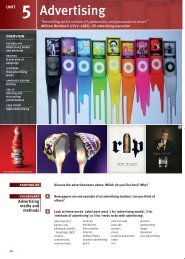



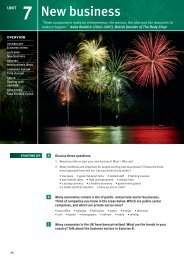


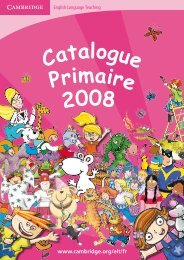
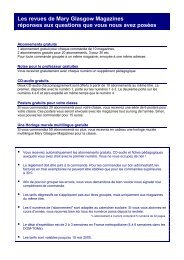



![hssisf=vy]u - Attica](https://img.yumpu.com/36514833/1/184x260/hssisfvyu-attica.jpg?quality=85)
